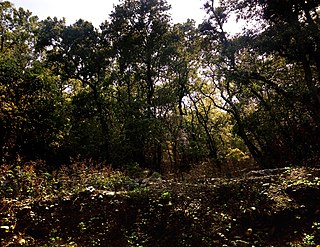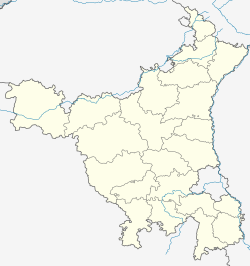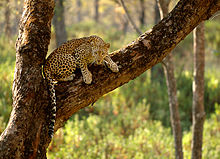
Kalesar National Park and adjacent Kalesar Wildlife Sanctuary (13,209 acres are protected areas in Kalesar of Yamunanagar district of Haryana state in India, 46 kilometres from Yamunanagar city, 122 kilometres from Chandigarh. Kalesar National Park was established in 2003. Kalesar National Park and Kalesar Wildlife Sanctuary are contiguous to Simbalbara National Park in Himachal Pradesh and Rajaji National Park in Uttarakhand. Kalesar is a popular destination for leopards, panthers, elephants, red jungle fowl and bird-watching. This forested area in the Shivalik foothills is covered primarily with sal with smattering of Semul, Amaltas and Bahera trees as well. Wildlife jeep safaris are available on 3 tracks. Park is closed July to September and during the remaining months visiting hours are 6 am to 10 am and 4 pm to 7 pm during summers, and 7 am to 11 am and 3.30 pm to 6 pm during winters.

Panchkula is a planned city and district headquarter in the Panchkula district in Haryana, India. It is a satellite town of the state capital Chandigarh. Panchkula is a border city with Punjab,Chandigarh and Himachal Pradesh. The origin of the name Panchkula came from the place where five irrigation canals meet. At present, it forms a part of an adjoining area to Chandigarh, Mohali, and Zirakpur. It is approximately 4 km (2.5 mi) southeast of Chandigarh, 105 km (65 mi) southwest of Shimla, 44 km (27 mi) from Ambala and 259 km (161 mi) northeast of New Delhi, the national capital. It is a part of the Chandigarh capital region or Greater Chandigarh. The Chandigarh-Mohali-Panchkula metropolitan region collectively forms a Chandigarh Tricity, with a combined population of over two million.

Pinjore is a town in Panchkula district in the Indian state of Haryana. This residential 'township', located close to Panchkula, Chandigarh, is set over 1,800 feet above the sea level in a valley, overlooking the Sivalik Hills. Pinjore is known for Pinjore Gardens, Asia's best 17th Century Mughal garden, and the Hindustan Machine Tools (HMT) factory.

Raipur Rani is a census town in Panchkula district in the Indian state of Haryana. It is located on the Panchkula city-Chandigarh-Nahan-Paonta Sahib-Dehradun highway 30 kilometres east from the Chandigarh-Mohali-Panchkula urban cities combine. It is about 20 kilometres from the Dera Bassi Industrial belt and 10 kilometres from the Barwala industrial estate. Narayangarh in the Ambala District is the next large town in its proximity.
Hathni Kund is a location of origin of Western Yamuna Canal in the Indian state of Haryana, built on a raised plinth overlooking the Yamuna River. The river flows into the plains of Haryana after crossing over the last lap of the Himalayan foothills at Paonta Sahib. The waters of the western Yamuna Canal were collected in the Tajewala Barrage, 5 kilometres (3.1 mi) from Hathni Kund, but this function is now provided by the newer Hathni Kund Barrage.
Morni is a village and tourist attraction in the Morni Hills at the height of 1,267 metres (4,157 ft) in the Panchkula district of the Indian state of Haryana. It is located around 45 kilometres (28 mi) from Chandigarh, 35 kilometres (22 mi) from Panchkula city and is known for its Himalayan views, flora, and lakes. The name of Morni is believed to derive from a queen who once ruled the area two thousand years back. She was said to be a just and noble ruler. Morni was also a jagir of Raja Mir Syed Muhammad Baquar Ali Khan.

Puadh is a historic region in north India that comprises parts of present-day Punjab, Haryana, Uttar Pradesh, Himachal Pradesh and the U.T. of Chandigarh, India. It has the Sutlej river in its north and covers the regions immediately south of the Ghaggar river. The people of the area are known as Puadhi and speak the Puadhi dialect of Punjabi. The capital cities of Puadh region are Rupnagar, Fatehgarh Sahib, Mohali, Patiala, Chandigarh, Nalagarh,Panchkula, Baddi ,Ambala, Yamunanagar

The following outline is provided as an overview of and topical guide to Haryana.
Khol Hi-Raitan Wildlife Sanctuary is situated in Panchkula district of Haryana State, India. It is 0.5 kilometres (0.31 mi) away from Panchkula on the Morni Road and its aerial distance from the Bir Shikargah Wildlife Sanctuary is only 3 kilometres (1.9 mi).
Saraswati Wildlife Sanctuary, also known as Seonsar Forest, is situated in Kaithal district of Haryana State, India. It is spread over an area of 4,452.85 hectares.

The Pheasant Breeding Centre, Morni is a purpose-built centre for the breeding of pheasants situated in Panchkula district in Morni, a village and tourist attraction in the Morni Hills in the Panchkula district of the Indian state of Haryana. It is located around 45 kilometres (28 mi) from Chandigarh, 35 kilometres (22 mi) from Panchkula as its district and is known for its Himalayan views, flora, and lakes.

The Jatayu and Sparrow Conservation Breeding Centre (JCBC), is the world's largest facility for the breeding and conservation of Indian vultures and the house sparrow. It is located within the Bir Shikargah Wildlife Sanctuary in the town of Pinjore in the State of Haryana, India. It is run by the Haryana Forests Department and Bombay Natural History Society with the help of British nature conservation charity Royal Society for the Protection of Birds. It is 8 kilometres (5.0 mi) from Pinjore and covers 5 acres (2.0 ha).

The Deer Park, Hisar, on Hisar-Dhansu in Hisar city of Haryana state in India has an area of 19 hectares including a 6-acre plot for producing fodder for the deer. Park as 4 species, blackbuck, chital spotted deer and 6 sambar. It also doubles up as the wildlife rescue clinic for the treatment injured wild animals and birds brought here by the people, which are released back in to the wild after the recovery.

The Kaushalya Dam is an earth-fill embankment dam on the Kaushalya river, which is a tributary of Ghaggar-Hakra River, in Pinjore of Haryana state, India. It was constructed between 2008 and 2012 with the primary purpose of water supply.
Forests Department, Haryana is a department of the Government of Haryana, a state in India, that runs and maintains many protected nature areas in the state of Haryana. It has two administrative divisions: Forest and Wildlife. The department is responsible for maintaining National Parks, Wildlife Sanctuaries and Conservation Reserves in Haryana. It also provides a special emphasis on Soil and Moisture Conservation works in the hills to conserve water and deliver it to adjacent farmlands. Two National Parks, eight Wildlife Sanctuaries, two Conservation Reserves, four Animal & Bird Breeding Centres, one Deer park, and 49 herbal parks. Kanwar Pal Gujjar has been the cabinet minister responsible for this department since October 2019. constitute the Protected Area network of the department, covering 0.75% of the state. It also maintains a list of Protected Areas in Haryana.
The Ch. Devi Lal Rudraksh Vatika Herbal Nature Park, in short Rudraksh Vatika, is a 184 acre forested wildlife area, wetland and herbal park for the conservation of biodiversity of over 400 endangered ayurvedic medicinal herbs in Shivalik foothills of Himalayas. It is located on the western bank of Western Yamuna Canal, 1.3 km east of NH-907, in Chuharpur Kalan village of Yamunanagar district of Haryana state in India.

The Mini Zoo is located on Grand Trunk Road near Pipli bus stand in Kurukshetra, Haryana, India.
Tourism in Haryana relates to tourism in the state of Haryana, India. There are 21 tourism hubs created by Haryana Tourism Corporation (HTC), which are located in Ambala, Bhiwani Faridabad, Fatehabad, Gurgaon, Hisar, Jhajjar, Jind, Kaithal, Karnal, Kurukshetra, Panchkula, Sirsa, Sonipat, Panipat, Rewari, Rohtak, Yamunanagar, Palwal and Mahendergarh.
Haryana State Directorate of Archaeology & Museums is a ministry and department of the Government of Haryana in India.















